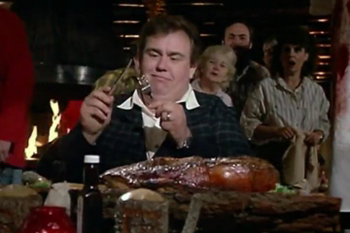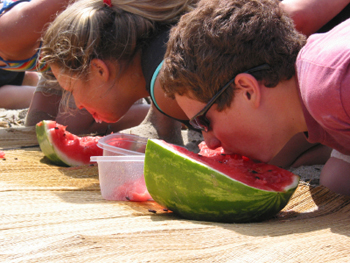The Olympic torch is still warm as many of us are still caught up in the spirit of the Games. The proof can be seen in retail, where swim, athletic shoe, and sport stores are seeing increased sales. We all have been inspired and want to let our competitive hearts seek greatness, too. But some aspire to greatness in a completely non-athletic, gut-busting way.
One event we didn’t see in London that will doubtfully ever grace an Olympic stage is gaining popularity at high rates in the U.S. That event is the “sport” of competitive eating. The roots of these types of events are nearly as ancient as the original Grecian games. A legend of a 13th century slave defeating the Norse god Loki by eating his plate is the earliest noted eating competition. However, in the U.S., these battles have only grown popular in the last 100 years or so.
NPR reported on their food blog, “The Salt,” that the annual Nathan’s Hot Dog eating contest on Coney Island was watched by 40,000 spectators this year. That’s up from about 1,000 viewers 15 years ago. Clearly, we’re intrigued by this gluttonous event many call “sport.” There are TV shows devoted to various food challenges, and many restaurants are creating their own variations to live up to the demand.
In fact, many restaurants base their eating challenges on the 1988 film The Great Outdoors, when John Candy enters a steak-eating contest that pushes him toward delirium. Should he successfully finish the 96-ounce steak meal laid before him in a set time period he doesn’t pay a dime. 
Like that one, most events today require the participant to eat as much food as possible in a short amount of time. Whether it’s hot dogs, oysters, pie, jumbo burgers, steak, or even ice cream, the variety of foods span the menu. Rarely are they off the “light and healthy” page though.
So, while these contests are fun to watch, what’s really happening to these contestants? Can eating like this hurt your body or have ill effects down the road? Deb Burchardt, M.S., R.D, L.D. approached the subject for us.
“I perceive that in reality it affects very few, because it appears that only a few can make the necessary physiological changes to become proficient at overeating. For the majority of the population it is too uncomfortable to be able to consume mass quantities of food in short periods of time; we throw up, we get sick, etc.”
After this year’s hot dog eating contest, repeat winner Joey Chestnut’s eating habits were revealed. How does he prepare to eat more than 16,000 calories in a few short minutes? By starving himself. Leading up to the contest he eats as many of a serving of 70 hot dogs as he can in 10 minutes. Then, three days before the contest, Chestnuts abstains from any food. Our resident nutrition expert, Mary Hartley, RD, said at the time that “Starving is of no significance here. The contestant is simply emptying his/her stomach to create as much room as possible before the contest. Competitive eating has nothing to do with day-to-day eating style and everything to do with winning $10,000.”
Since the subject is so rare for a dietitian to deal with, there’s not a lot of research about the topic. For the few in the minority who do competitively eat, the young research isn’t concluding any good news though. An article from the American Journal of Roentgenology titled, “Competitive Speed Eating: Truth and Consequences,” concludes that this type of eating is a “potentially self-destructive behavior.” Issues of morbid obesity, gastroparesis (the stomach loses the ability to empty its contents), and possible needs for a gastrectomy (partial or full extraction of the stomach) are just a few of the negative side effects that await some speed eaters.
While many may attempt a competition, so few actually succeed or pursue on-going competitions. But Burchardt believes the current interest is growing because the participants see a chance to “win.”
“As a dietitian I see competitive eating outside the boundaries of ‘normal’ eating. It is in many ways pure competition. One more thing that someone has figured out how to make money on. And any time you offer money, or even a prize, it is amazing how many people are willing to do something that is not necessarily healthy in order to ‘win’.”
While the title of hot dog champion may not be as prestigious as “most decorated Olympian” or “fastest man on the planet,” the Major League Eating (MLE) organization has approached the Olympic Committee to attempt to make their sport a medal-worthy event. So far, no one’s ready for this to join the Summer Games.
It’s probably best, according to Burchardt.
“I personally or professionally have in my 30 years as a dietitian never known a ‘serious’ competitive eater. They are rare, and in my professional opinion that is a very good thing!”
Also Read:
Joey Chestnut Wins Nathan’s Hot Dog Contest by Eating 16,052 Calories
Michael Phelps’ Diet Spoofed on SNL
images via NY Daily News, Time, iStock
